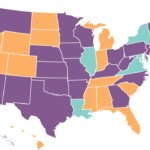On Sept. 1, 2021, a new law went into effect in Texas that sets a new gold standard for prior authorization legislation.
Commonly referred to as gold card legislation, H.B. 3459 establishes a continuous prior authorization exemption for physicians who earn a 90% approval rate on prior authorization requests for a given service over a period of six months. It is a relatively simple but, thus far, novel concept in state prior authorization legislation. The law went into effect on Sept. 1 but will only apply to requests made starting Jan. 1, 2022.
Remarkably, the legislation passed the House by a vote of 140-4 and the Senate unanimously. In an era marked by partisan political rancor, the importance of this bipartisan victory on what can be a difficult issue cannot be understated. The Texas Medical Association (TMA) deserves an immense amount of credit for leading this effort and achieving a resounding victory over the powerful payer lobby.
The idea of a prior authorization gold card is not new. The AMA developed the concept and included it in its Prior Authorization and Utilization Management Reform Principles. The ACR helped shape the concept and was part of a core group of provider and patient groups that joined the AMA statement in support of these principles.
The implementation process will be very important with this piece of legislation. With the approval rate benchmark set at 90%, it will be important to monitor payer and pharmacy benefit manager activity to ensure they do not increase denial rates to keep physicians just below the 90% threshold and thwart the intent of the legislation. The ACR will continue to work with the TMA and other partners in the state to watch for and address unexpected issues that may arise during the implementation process.
Implications for Future Reform
The ACR would like to see more states pass gold card legislation. However, that may become an even greater challenge moving forward. Now that gold card legislation has proven to be viable in Texas, it is likely that the payer lobby will spend a great deal of resources to defeat future state efforts. However, the early win in a state as large as Texas creates the opportunity to collect an ample amount of data to evaluate proof of concept. If a gold card works in Texas, it will work elsewhere. Hopefully with time, the data will become too compelling for legislators to ignore.



